Planning worship?
Check out our sister site, ZeteoSearch.org,
for 20+ additional resources related to your search.
- |
User Links
Browse People
Simeon Coan
Composer of "DELIGHT [2]" in The Southern Harmony, and Musical Companion (New ed. thoroughly rev. and much enl.) Possibly from Guilford, Connecticut?
Simeon Coan
Charles Coates
Person Name: Chas. Coates Author of "Little Children, You'd Better Believe"
Charles Coates
Eric Coates
1886 - 1957 Person Name: Eric Coates, 1886-1958 Composer of "DAMBUSTERS' MARCH" in Common Praise
Eric Coates
Florence Earle Coates
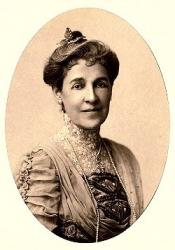
1850 - 1927 Author of "I thank thee that howe'er we climb" in The Student Hymnary Florence Van Leer Earle Nicholson Coates (July 1, 1850 – April 6, 1927) was an American poet.
She was born in Philadelphia, Pennsylvania. Granddaughter of noted abolitionist and philanthropist Thomas Earle, and eldest daughter of Philadelphia lawyer George H. Earle, Sr. and Mrs. Frances ("Fanny") Van Leer Earle, Mrs. Coates gained notoriety both at home and abroad for her works of poetry—nearly three-hundred of which were published in literary magazines such as the Atlantic Monthly, Scribner's Magazine, The Literary Digest, Lippincott's, The Century Magazine, and Harper's. Many of her poems were set to music by composers such as Mrs. H. H. A. Beach (Amy Cheney Beach), Clayton Johns, and Charles Gilbert Spross. She attended school in Lexington, Massachusetts sometime between 1864 and 1867 under the instruction of abolitionist and teacher Theodore Dwight Weld, who had "charge of Conversation, Composition, and English Literature," and would further her education abroad at the Convent of the Sacred Heart in Paris (Rue de Varenne), and by studying music in Brussels under noted instructors of the day.
Literary and social critic Matthew Arnold both encouraged and inspired Mrs. Coates' writing of poetry. He was a guest at the Coates' Germantown home when his lecture tours brought him to Philadelphia. Coates and Arnold first met in New York—during Arnold's first visit and lecture tour of America—at the home of Andrew Carnegie, "where they formed a lasting friendship." The tour (which lasted from October 1883 to March 1884) brought Arnold to Philadelphia in December 1883, where he lectured at Association Hall on the topics of the "Doctrine of the Remnant" and on "Emerson." His second visit and tour of America took place in 1886, and brought him to Philadelphia in early June where he was again hosted by Mr. and Mrs. Coates and spoke on the topic of "Foreign Education" at the University of Pennsylvania chapel. Arnold wrote to Mrs. Coates in 1887 and 1888 from his home at Pains Hill Cottage in Cobham, Surrey, England describing his remembrance of and fondness for her "tulip-trees and maples." Rarely did Mrs. Coates write or publish prose work, but in April 1894 and again in December 1909, she dedicated her pen to remembrances of her mentor in issues of the Century and Lippincott's magazines respectively.
The Coates' often spent their summer months in the Adirondacks, where they maintained "Camp Elsinore"—their summer camp by the Upper St. Regis Lake. It was there that they entertained, rested and escaped the humidity of Philadelphia summers. In the early 1900s (decade), the Coates' seasonally opened their camp to Anna Roosevelt Cowles ("Bamie")—elder sister of Theodore Roosevelt. Among Mrs. Cowles' visitors during her stays at Elsinore was Alice Roosevelt, President Theodore Roosevelt's daughter. Many of Mrs. Coates' nature poems were inspired by the flora and fauna of the Adirondacks.
In the March 1913 issue of Lippincott's Monthly Magazine, noted anthologist and poet, William Stanley Braithwaite (1878–1962), gives a detailed 9-page review of Mrs. Coates' poetry, relating how "she draws from the Olympian world figures that typify some motive or desire in human conduct, and in the modern world the praise of men and women, heroic in attainment or sacrifice; or laments events that effect social and ethical progress, showing how beneficently she has brought her art, without modifying in the least its abstract function as a creator of beauty and pleasure, into the service of profound and vital problems." Much of Mrs. Coates' later published work was written during the years spanning World War I and showcased her concern for such "profound and vital problems" as her voice joined the chorus of 'singers' in support of American involvement in the war—evidenced in her privately published pamphlet of war poetry, Pro Patria (1917). Mrs. Coates also penned several other works of fugitive verse, much of which is patriotic and war-related, describing the selfless sacrifices made by soldiers and citizens alike for the cause of freedom and liberty.
Florence was a founder of the Contemporary Club of Philadelphia in 1886; one of twenty founders of the Society of Mayflower Descendants in the Commonwealth of Pennsylvania in 1896—herself being a ninth generation descendant of Pilgrim John Howland; and twice president of the Browning Society of Philadelphia from 1895 to 1903, and again from 1907 to 1908. In 1915, Florence was unanimously elected poet laureate of Pennsylvania by the state's Federation of Women's Clubs.
She married first, William Nicholson—who died in 1877 after only five years of marriage. On 7 January 1879, she married Edward Hornor Coates at Christ Church in Philadelphia. Mr. Coates would eventually adopt Florence's daughter from her first marriage—Alice Earle Nicholson. Florence and Edward had one child together in 1881, but the baby—Josephine Wisner Coates—died in infancy. Mr. Coates was president of the Pennsylvania Academy of the Fine Arts from 1890 to 1906. He died on 23 December 1921. In 1923, Mrs. Coates presented The Edward H. Coates Memorial Collection to the Pennsylvania Academy of the Fine Arts in Philadelphia. The exhibition included 27 paintings and 3 pieces of sculpture, and was displayed from 4 November 1923 to 10 January 1924. Florence died at Hahnemann Hospital in Philadelphia on 6 April 1927. She is buried at the Church of the Redeemer churchyard in Bryn Mawr, Pennsylvania alongside her husband and her brother George Howard Earle, Jr. and many of his descendants, including his son, former Pennsylvania Governor, George Howard Earle III—Florence's nephew.
--en.wikipedia.org/wiki/
Florence Earle Coates
Kenneth W. Coates
b. 1917 Person Name: Kenneth W. Coates, b. 1917 Composer of "ST. HELENS" in Trinity Hymnal (Rev. ed.)
Kenneth W. Coates
Stephen Coates
b. 1952 Person Name: S. K. Coates, 1942- Arranger of "CALYPSO CAROL" in Together in Song
Stephen Coates
Clyde E. Coatney
Author of "Mother's prayers will still live on" in Echoes of Heaven
Clyde E. Coatney
J. B. Coats
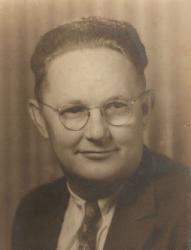
1901 - 1961 Editor of "" in Mississippi Melodies; a Choice Selection of Songs Suitable for Most Any Occasion J.B. Coats was born on April 6, 1901, in Summerland, Mississippi. He attended the schools of his area and was both a student and lover of music all his life...His formal education was continued with study at Mississippi Southern College and Louisiana State University. He also studied music with Julius Rishing, J.E. and Alvis O. Thomas and T.B. Mosley. When just a lad about fourteen, he began teaching music classes and conducting evangelistic singing. Mr. Coats was a teacher in public schools most of his life...He was the composer of many loved gospel songs with "Where Could I Go" haveing been printed and sung most widely. Others of his outstanding songs are "A Wonderful Place", "My Soul Shall Live On", "I'm Winging My Way Back Home", and "Tomorrow May Mean Goodbye". Many of his songs have been recorded by leading quartets and singers...Mr. Coats was associated with Stamps-Baxter Music Company and a lifetime staff writer for them...He joined the Baptist Church and served more than thirty years as a Deacon before answering the call to the ministry. He died on December 15, 1961.
--doyouknowhowgodlovesyou.blogspot.com
J. B. Coats
Mrs. J. B. Coats
Person Name: J. B. Coats Author of "Keep me, hide me, O my father" in Harmony in Praise
Mrs. J. B. Coats
Abner P. Cobb
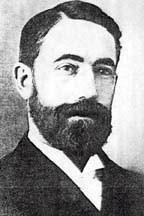
1853 - 1923 Author of "Be ready when he comes" in Billows of Song Born: October 27, 1853, Wooster, Ohio.
Died: February 11, 1923.
Buried: Fairlawn Cemetery, Decatur, Illinois.
Cobb’s family moved to Decatur, Illinois, when he was about 13 years old. As a young man, he worked as a machinist. He graduated from Eureka College, Eureka, Illinois, in 1878, and pastored in Normal, Washburn, Petersburg and Springfield, Illinois; Des Moines, Iowa; Covington, Kentucky; and San Antonio, Texas. He was also an active evangelist, attending meetings in Boston, New York City, Minneapolis, and other major cities.
--www.hymntime.com/tch/
Abner P. Cobb
Gerard Francis Cobb
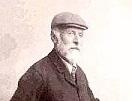
1838 - 1904 Person Name: Gerard Francis Cobb, 1838-1904 Composer of "COBB" in The Cyber Hymnal Gerard Francis Cobb was born at Nettlestead (near Maidstone), Kent, on 15 October 1838, the youngest of five children of the Reverend William Francis Cobb (1795-1862) - the rector of Nettlestead - and his wife, Mary Blackburn. The five children were:- 1. Mary (1826-1906), 2. Clement Francis (1821-1896), 3. William Francis (1831-1916), 4. Francis (1834-1920), and 5. Gerard Francis (1838-1904). (The patronymic ‘Francis' occurs in several generations. Gerard's grandfather was Francis Cobb (1759-1831), a brewer and banker of Margate, whose sons were William Francis (Gerard's father), John Francis and Thomas Francis. Gerard's brother Clement also had a son Francis William (1872-1938). The parents were both musical, the mother being a pianist (and latterly organist at Nettlestead) and the father a ’cellist. Gerard early showed an aptitude for music and was able to pick out a tune on the piano while still a child, and without any formal instruction.
Gerard Francis Cobb was educated at Marlborough College from 1849 to 1857. (His brothers William and Clement were also educated there.) He was a bright pupil, reaching the Sixth Form in September 1854 (still aged 15) and winning several prizes - the Divinity Prize (Summer 1853), the Upper Fifth Prize (Summer 1854), the Lower Sixth Prize (Christmas 1854) and the English Essay Prize (1856). He was also appointed a College Prefect and (when he left school) donated a cup as an inter-house singing trophy. (Inter-house singing competitions continue to be popular at Marlborough to this day.) Two concert programmes from Marlborough College (Christmas 1854 and Christmas 1856) show his active involvement as singer, pianist and harmonium player, although in neither programme is there any indication of a composition by him.
From Marlborough Cobb went up to Trinity College, Cambridge, matriculating in 1857. He was elected a Scholar in 1860, and graduated B.A. in 1861 with a double first in the Classical and Moral Science Triposes. He then went to Dresden for a short time, to study music. While there, he perfected his knowledge of German, later providing English translations for three of the texts of his own Lieder und Gesang (1885); he was also proficient in French and Italian, as well as being an excellent classical scholar. (Cobb wrote the words of at least one of his own songs - "Reconciliation" (c.1891) - and inserted a verse of his own into another song - "Drawbacks" (1892), words by Henry S. Leigh.)
It may have been at this time that he decided not to make music his profession: he returned to Cambridge, where he spent the rest of his life. He was elected a Fellow of Trinity in 1863, proceeding M.A. in 1864, and in 1869 was appointed Junior Bursar of his college. This office, which he held for twenty-five years and in which he showed great business capacity, seems to have centered around the day-to-day running of the college, which included looking after the accommodation of some six hundred students (Trinity was the largest of all the Oxbridge colleges) and even making sure that the brewery horse had the correct number of nails in his shoes! (The college had a small brewery).
Cobb's interests were many and varied. There was music, of course, but (appropriately, as the son, brother and uncle of rectors) he was also much interested in Church matters: he was in sympathy with the Tractarian movement (associated with Newman, Pusey, Keble, Forbes and Froude) and at one time contemplated (but finally declined) holy orders. He actively advocated union between the Anglican and Roman communities, and published an elaborate treatise which caused a sensation in ecclesiastical circles. A second edition (with a sequel) followed and this, in turn, was followed by two short tracts. Even as late as the 1860s there was a form of religious intolerance which although not life-threatening (as in the reigns of earlier monarchs) nevertheless ensured that a career in the Church would no longer be an option for Cobb. His appointment at Trinity was timely, and his energies were then directed towards the running of the College and to the pursuit of music.
Cobb was a fine organist, and gave occasional recitals at Trinity. His writings include a history of the organ and an account of the choir which, apparently, he also trained. He was, too, the University’s representative on municipal affairs and produced pamphlets on rather more mundane matters than were normally dealt with in "the olive-grove of Academe".
When Cobb went up to Trinity in 1857 the Professor of Music was the recently appointed (1856) William Sterndale Bennett (1816-1875). Cobb enjoyed Bennett's friendship and was helpful to him in dealing with the Faculty of Music. In the last years of his life, Bennett made use of two bound octavo music note-books in which he jotted down sketches and ideas; these books had been brought to him from Germany by Cobb.
On Bennett's death, the Professorship passed to the blind George Macfarren (1813-1887). Cobb proved equally helpful to the new incumbent, particularly in the reform of the Faculty. He had been elected President of the Cambridge University Musical Society in 1874 and became Chairman of the University Board of Musical Studies in 1877, serving in that capacity for fifteen years.
Aside from his work at Trinity, and his musical, religious, and municipal interests, there is yet one more facet of this Victorian polymath which must command our attention. He was, perhaps surprisingly, a great lover of outdoor activities - swimming, walking, hill climbing, and - above all - cycling. He was one of the founders - and first President (1878) - of the National Cyclists' Union (originally the Bicycle Union) and was also President of the Cambridge University Cycling Club. For the International Health Exhibition (1884) he contributed a chapter on 'Cycling' to the handbook on athletics, part 11.
Cobb thought so much of cycling that his enthusiasm induced not only undergraduates but even many of the Dons to take to it (33). He celebrated his sixtieth birthday by undertaking a cycle run of sixty miles in company with one of his nephews. Cobb was not very tall and was almost equalled in height by his earlier high cycle, although in later years he rode what was then called a 'safety cycle' (which was smaller) and, eventually a 'free wheel bicycle'. (The cycle which features in the accompanying photograph is presumably a 'safety' or 'free wheel' machine.)
Little is known of Cobb's life outside Cambridge. His duties at Trinity would have kept him there for most of the year, and his dealings with his London publishers were probably conducted by letter. His name appears on the invitation lists of several of the Royal Society of Musicians' annual dinners in the 1880s and, although he did not attend any of these, he is recorded as having made several donations to the Society.
In 1893 Cobb married Elizabeth Lucy Parkinson, widow of Stephen Parkinson, Fellow and Tutor of St. John’s College, Cambridge, and (in accordance with the custom of the time) resigned his offices at Trinity. He continued to reside in Cambridge - at The Hermitage Silver Street - and devoted himself mainly to musical composition. From this last period of his life came the second (1893) and third (1897) sets of Barrack-Room Ballads (the first having appeared in 1892) and his delightful Twenty-four Songs for Little People (1897) to words by Norman Gale (d. 1942), as well as works on a larger canvas, including his most ambitious work - A Song of Trafalgar Op. 41, a Ballad for men's voices (solo and chorus) and orchestra (1900), to words by Edith Nesbit (1858-1924) - remembered today as the author of The Railway Children (1906).
Among Cobb's large-scale works is reputed to be a Symphony although no trace of this has yet come to light. What can be stated with certainty, however, is that on 27 November 1902 a concert was held at the Winter Gardens, Bournemouth, given by the Municipal Orchestra under the direction of Dan Godfrey, jun. - later Sir Dan Godfrey (1868-1939) - and Gerard Cobb, who conducted "For the first time in Bournemouth" (and probably the first time anywhere) three of his own works - Introduction and Allegro Giocoso in B flat, Valse Pathétique 'Niobe', and Romanza for Orchestra, in E flat (performed at a Prom in 1901); two of Cobb's earlier songs - "I wish to tune my quivering lyre" (written in 1868) and "Mount, Gallants all!" (published c.1890 were sung by Henry Corner. (An orchestral score and band parts for "Mount, Gallants all!" were available for hire from the publishers, and it must be assumed that both songs were given with orchestral accompaniment.)
Cobb's last-known compositions were three further settings of poems by Kipling - not from the Barrack-Room Ballads this time, but from a similar collection, Service Songs. The three songs. - "M.I." (Mounted Infantry of the Line), "The Married Man" (Reservist of the Line), and "Lichtenberg" (New South Wales Contingent) - had been commissioned by Charles Sheard, who had published his settings of the Barrack-Room Ballads and they were completed just a few days before his death. Sheard published them later that year.
Gerard Francis Cobb died at The Hermitage on 31 March 1904. having succumbed to an attack of pneumonia. He was cremated at Woking on 5 April at 12.00 noon, at which precise time a memorial service was held at Trinity College Chapel; the music was all by Cobb. His ashes were laid to rest on 8 April in the churchyard at Nettlestead, where his widow erected a handsome cross in his memory.
http://www.musicweb-international.com/classrev/2004/oct04
Gerard Francis Cobb
Henry N. Cobb
Person Name: Rev. H. N. Cobb Author of "Father, Take my Hand" in Gospel Hymns Nos. 1 to 6
Henry N. Cobb
Sylvanus Cobb
1798 - 1866 Editor of "" in Family Singing Book. Rev ed. with Supplement Cobb, Rev. Sylvanus. (Norway, Vermont, July 17, 1798--October 31, 1866, East Boston, Massachusetts). A Universalist minister who served churches in Maine and Massachusetts; an editor, author, and reformer. Tufts College gave him the honorary degree of D.D. in 1863. His hymn beginning "Great God, before thy throne we bow" is included in Church Harmonies: New and Old, 1895.
--Henry Wilder Foote, DNAH Archives
Sylvanus Cobb
Sylvia Rose Cobb
b. 1954 Person Name: Sylvia Rose Author of "Comfort Me" in Songs of Faith Sylvia Rose Cobb (b. c.1954) attended Southwestern Christian College (Terrell, Tex.) and completed her undergraduate studies at Harding University (Searcy, Ark.). She taught music at Southwestern Christian College for three years and has lived most of her life in the Detroit, Michigan metropolitan area, teaching, writing, singing, and publishing music. Her Songs of Faith hymnal is a collection of fifty spiritual songs she authored and composed.
Sylvia Rose Cobb
Thomas S. Cobb
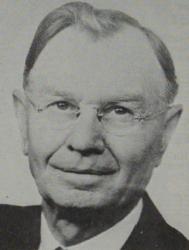
1876 - 1942 Author of "Come home, come home, Jesus is speaking so true" in Zion Songs, Spiritual Hymns Thomas S. Cobb (1876-1942), a native Texan, was educated in much the same circles as [Austin] Taylor, and received his music diploma from the Western Normal and College of Music in Dallas. He taught singing schools across Texas and the bordering states, and was particularly noted for the "Cobb Quartet" made up of his four daughters. He was recruited to Firm Foundation by Showalter in 1935.(Finley, 122ff.) Cobb edited only four hymnals for Firm Foundation before his death in 1942, but among these was the significant New Wonderful Songs (1933); at 296 hymns it was part of the trend toward more substantial publications.
Prior to his work with Firm Foundation, Cobb edited hymnals for the Quartet Music Company of Fort Worth, Texas. A search of WorldCat.org shows that he was involved with at least 7 books for this publisher, going back as far as the 1890s when it was called the "Quartette Company." One of these earlier works From the Cross to the Crown (1921?) was subtitled, "Scriptural Songs," and was co-edited with Elder T. B. Clark and T. B. Mosley, one of the most well-known singing school teachers among the Churches of Christ in the southeastern U.S. Mosley was also known as a staunch doctrinal conservative. This gives some idea of the bona fides Cobb brought with him during the era of the "hymnal controversy" surrounding E. L. Jorgenson's Great Songs of the Church. Jorgenson was firmly in the premillennial camp, and was an editor of Word and Work, the primary voice of this viewpoint within the Churches of Christ. Opponents of premillennialism objected to several hymns in Great Songs that supported this doctrine, or were at least questionable. (Most of these were removed or altered in the better-known "No. 2" edition).
Thomas S. Cobb passed from this life in 1942, shortly after the last of the pre-war Firm Foundation hymnals appeared.
--drhamrick.blogspot.com/2012/01/hymnals-published-by-firm-foundation.html
Thomas S. Cobb
Frances P. Cobbe
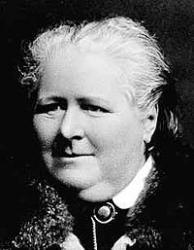
1822 - 1904 Author of "God draws a cloud over each gleaming morn" in The Day School Hymn Book Cobbe, Frances Power, daughter of Charles Cobbe, D.L., of Newbridge House, Co. Dublin, was born Dec. 4, 1822. She has written extensively on various subjects. The most important of her publications are:—
(1) Essay on Intuitive Morals; (2) Religious Duly; (3) Broken Lights, 1864; (4) Duties of Women; and others. She also edited the Works of Theodore Parker, in 12 vols.
Miss Cobbe has written only a few poems. Two of these were included in her Italics; Brief Notes on Politics, People, and Places in Italy in 1864 (1864), and a third in a Birthday Address to Lord Shaftesbury. Her hymn, "God draws a cloud over each gleaming morn" (Rest in the Lord), was written in 1859, in reply to some verses by an acquaintance, which were of a sad and despairing tendency. It has passed into several collections, including Horder's Congregational Hymns, 1884, and others. Died in April, 1904. [Rev. W. Garrett Horder]
--John Julian, Dictionary of Hymnology (1907)
Frances P. Cobbe
Ingram Cobbin
1777 - 1851 Author of "A throne of grace, then let us go" in The Baptist Psalmody Cobbin, Ingram, M.A., born Dec, 1777, and educated for, the Congregational Ministry at Hoxton College. Entering the ministry in 1802, he was successively pastor of congregations at Banbury, at Holloway, at Putney, and at Crediton. He was also for some time Secretary of the Home Mission Society. He died at Camberwell, March 10, 1851. His publications were numerous, including Scripture Parables in Verse, 1818; The Village Hymn Book, 1820; and a translation of Caesar Malan's Hymns, 1825. He also contributed the following hymns to the Baptist New Selection, 1828:—
1. As blows the wind, and in its flight. Regeneration.
2. Before the Almighty power began. Sovereign Grace.
3. If 'tis sweet to mingle where. Prayer Meeting.
4. Lord! there is a throne of grace. Prayer.
5. Lord! to Thy bounteous care we owe. Harvest.
Of these hymns, Nos. 3 and 4 are in the most extensive use, and are given in several modern collections, specially amongst the Baptists.
--John Julian, Dictionary of Hymnology (1907)
=========================
Cobbin, Ingram, p. 239, ii. The hymn A throne of grace! then let us go" (The Throne of Grace), which is found in several American hymnbooks, is usually attributed to this author, but we have failed to trace it in any of his works.
--John Julian, Dictionary of Hymnology, Appendix, Part II (1907)
Ingram Cobbin
C. H. Cobbs
Person Name: C. H. C. Author of "How I Got Over" in The New National Baptist Hymnal
C. H. Cobbs
Tasha Cobbs-Leonard
b. 1981 Person Name: Tasha Cobbs Leonard Author of "This Is A Move" in CCLI Top 100
Tasha Cobbs-Leonard
Kenneth Lorne Cober
1902 - 1993 Author of "Renew Thy Church, Her Ministries Restore" in Trinity Hymnal (Rev. ed.) Born: July 12, 1902, Dayton, Ohio.
The son of missionaries, Cober grew up in Puerto Rico. He attended Bucknell University and Colgate Rochester Divinity School, and was pastor of the First Baptist Church, Canandaigua, New York; and the Lafayette Avenue Baptist Church, Buffalo, New York. He served the American Baptist state conventions in New York, Rhode Island and Connecticut, and was executive director of the Division of Christian Education for the American Baptist Convention (1953-70). He retired to Penney Farms, Florida. His works include:
The Church’s Teaching Ministry, 1964
Hymnbook for Christian Worship, 1970 (committee member)
--www.hymntime.com/tch/
Kenneth Lorne Cober
Rosemary C. Cobham
Author of "Home Is the Consciousness of Good" in Christian Science Hymnal
Rosemary C. Cobham
Sergio Cobián
1889 - 1962 Person Name: S. Cobián Translator of "Abrid la puerta y entara"
Sergio Cobián


 My Starred Hymns
My Starred Hymns


